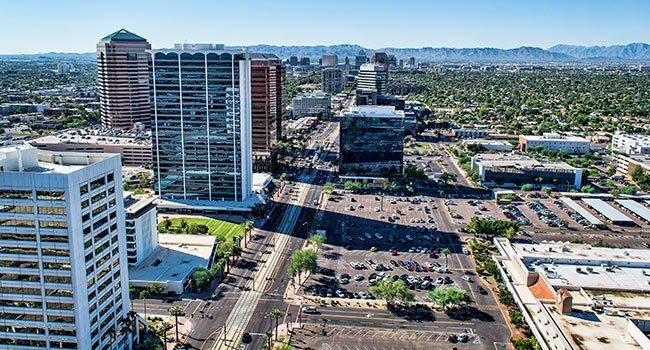It has been found that the City of Phoenix owns a lot of excess vacant land and as a result, Phoenix is hoping to sell the land parcels it doesn’t need to developers.
The City of Phoenix owns about 1,400 plots of land, which is worth more than $150 million in total, according to a report by the Arizona Republic.
The City of Phoenix created a portal where you can view the land that’s currently available online. The site shows the vacant plots on a map of the city, giving square footage, uses and listing prices.

Developers use Phoenix-owned vacant land for developments for many projects. The land where multifamily development Portland on the Park is being developed on was a Phoenix owned vacant site before developers purchased the property.
With this new batch of vacant land plots available, with more on the way, could the next big development stem from one of these for sale sites?
As more opportunities for land development in Phoenix could stem from these excess vacant land sites, we recently connected with Fennemore Craig commercial real estate Attorney Joseph Chandler to talk about the process of buying land from the City and if the next big development could come from these properties.
AZRE: Do you think city property is an un-tapped area of land for development projects
JC: Yes and no. This program provides another source of property for the creative developer. However, it all comes back to the three golden rules of development: (1) timing; (2) location, location, location; and (3) who is paying for it. The opportunity will depend on what type of property the City is marketing, where the property is located, the valuation of the property, and its potential for redevelopment. The properties are generally offered “As-Is, Where-Is” and are subject to the property’s current zoning. It is against State law for the City to sell its surplus property subject to a re-zoning, therefore , all of the properties are to be sold subject to the existing zoning. Such a scenario creates a conflict of interest between the City’s goal to dispose of surplus property and the City’s administrative obligations in any re-zoning case. Accordingly, it will be incumbent on the purchaser to complete its due diligence on the subject property in advance of the close. A buyer seeking to re-zone a property will need to wait until after the close of escrow and take the risk that the City may not grant the requested re-zoning. Also, some properties may be sold to deed restrictions limiting use of the property to a specific use. In such case, the owner would be bound to using the property to the stated use going forward.
AZRE: Should buyers expect a discount?
JC: While negotiations of purchase prices are possible, a buyer should not automatically expect a discount of the listed price. The City has a fiduciary duty to recoup its initial investment in the real property that is now surplus. Many of the subject properties were obtained for specific City projects, such as rights-of-way expansions, condemnation or eminent domain proceedings, or City-sponsored initiatives. Often, the City has accomplished the particular goal for the bulk of the initially-acquired real property, and is now in the process of disposing of surplus property.
AZRE: What is the process?
JC: The City’s Department of Real Estate periodically reviews its land holdings and identifies surplus property that can be sold. The City then begins to market those properties through the City’s website. The properties range from single-family residential to commercial to industrial. In certain circumstances, the City will also put out RFPs to the Arizona commercial brokerage community to represent the City in the sale of specific types of property (i.e., low-income dwelling units, office buildings, industrial warehouses, or vacant land).
AZRE: Who does the negotiating for the City?
JC: The City’s Real Estate personnel primarily handle the negotiations of the purchase contract. In the event that the City has engaged a broker, the real estate broker will assist the City in the negations. Depending on where the subject property is located, a member of the respective City Council office may also be involved in high profile property negotiations.
AZRE: Is a Council vote required to approve the sale?
JC: Yes, all properties to be sold by the City must be approved by the City Council. Once the purchase contract is negotiated, the subject property’s sale is subject to approval by the City Council. These routine transactions are typically handled as consent agenda items. However, for a more significant transactions, the sale may be vetted by a full hearing and a specific agenda vote by the City Council.
AZRE: How does the City’s decision to reduce its real estate holdings benefit the community?
JC: The benefit to the Community is four-fold. First, the City is recouping funds from an initial acquisition; these sales proceeds are then generally returned to the original source of funding to offset the costs arising from the original investment. Second, the City is reducing the costs of maintenance derived from the upkeep of these properties. Third, the City is reducing its potential liabilities as a real property owner. Fourth, once in private ownership, these properties are returned to the tax rolls for payment of real property taxes, which means tax dollars to support public works in the Community.
Correction: An earlier version of this article stated that the vacant hotel that was eventually turned into Found:RE was formerly a Phoenix owned site, but it was the land Portland on the Park is being developed on that was a Phoenix owned vacant land site.




